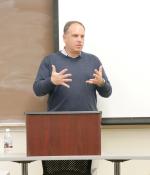Isenberg Graduate Talks Sports Analytics
April 24, 2019

“Analytics began with data tracking in football, basketball, and soccer,” Mike continued. Building on that foundation, today’s teams marshal increasingly granular, IT-enabled data collecting to home in on performance and its ingredients. At the same time, IT fosters continuous learning and helps analysts to connect the dots between data points. Collection covers a wealth of variables, including the influence of wind direction, team performance at home versus on the road, and opponents’ most impactful plays. Mike remarked that only three or four plays typically decide a game’s outcome.

Today’s NFL athletes, he continued, wear chips that monitor them during training and in games. That allows teams to better predict medical risks and physical attributes that contribute to performance. In addition, analytics also play a growing role in contract arrangements, draft picks, and trades with other organizations. And, Mike added, analytics arm coaches and general managers with evidence when they pitch a team’s owners for additional resources.
Succeeding with analytics, Mike observed, requires attention to three enterprises: collecting the right data, refining and analyzing those data, and communicating findings and subsequent decisions to the entire organization. But, he cautioned, beware of hubris: “Our plan is firmly etched in pencil. Life gets in the way.” You must also learn to identify and cultivate respect for randomness. It accounts for 20 percent of outcomes, he noted.
“Isenberg is really world class,” Mike told the class. “Take your incredible skills and see where barriers to entry are lower. Create value for your employers and learn new skills along the way. Reverse engineer the job that you ultimately want to have. And adopt the mindset that your next job won’t be your final one.”